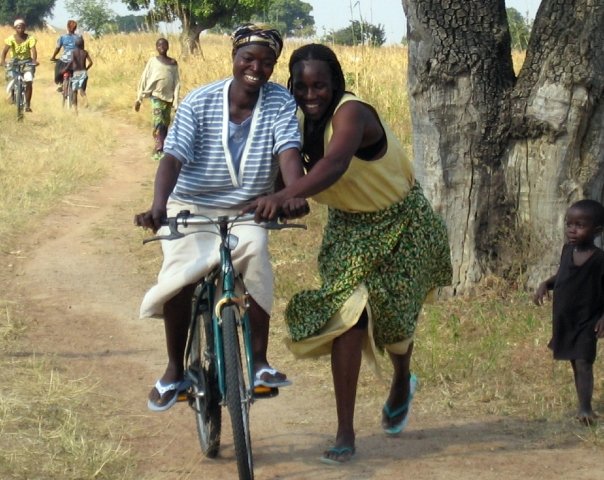 Cristan Hassan Acosta Villafane teaches woman to ride a bike provided by Bikes for the World (Source: All photographs supplied courtesy of BikesfortheWorld.org)
Cristan Hassan Acosta Villafane teaches woman to ride a bike provided by Bikes for the World (Source: All photographs supplied courtesy of BikesfortheWorld.org)
Bicycling for most Americans is a leisure activity. Something we do on weekends or evenings. We often take bicycles for granted.
But in Third World countries, a bicycle can be a game-changer - a tool for earning a living, attending school, or saving a life. Farmers can carry their produce to market. Tradesmen can carry their tools over a wider service area and earn more.
Students living at a distance from school can get there quicker, on time, and with more energy to learn. Health workers serving low-income communities can move from household to household faster, carrying more medications and serving more patients.
That's where Bikes for the World comes in. This growing charity's mission is to collect usable bicycles in the United States, and donate them around the globe to programs serving and raising the productivity of the poor.
"A bicycle enables someone to move four times faster than walking and carry four times more. It can broaden their horizons, provide more control over their schedules and give them hope. It can make a significant difference in peoples' lives," said the organization's founder and executive director Keith Oberg.
Oberg has traveled overseas and personally seen the impact that owning a bicycle can make on a large scale. In sub-Saharan Africa, for example, it is estimated that some five million people depend on bicycles for their livelihood. Millions more could increase their incomes if they had a bike and didn't have to walk everywhere when doing their daily tasks.
In the absence of affordable transportation, millions of students in rural areas face the challenge of whether to continue their education at the critical transition from village-level primary school to a regional high school often located miles down the road.
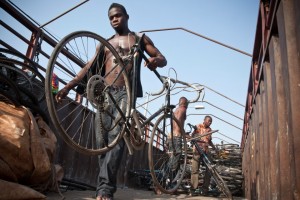 Bikes from Avenues Bicycle Projec
Bikes from Avenues Bicycle Projec
A bicycle can be the difference between staying in school or dropping out. This is true especially for girls, who at this age are held back by increasing household chores, cultural values and concerns for safety.
Bikes for the World uses a unique model to make use of unappreciated resource
Previously, used bikes and spare parts were scattered across the country and impossible to "bulk sort," and ship economically.
Bikes for the World enlists the participation of hundreds of community service organizationsâ€â€Âfaith-based communities, schools, service clubs, Scout troopsâ€â€Âand local businesses and public entities to collect all types and sizes of bikes and parts in repairable or better condition. Volunteers do the bulk of the work at their dispersed sites and at the Bikes for the World principal warehouse in Northern Virginia.
In effect the organization operates on a large scale like a clearinghouse, "wholesaling" appropriate types of bikes to charity partners, each with different needs in diverse contexts. An urban project will take more narrow-tired road bikes, appropriate for paved roads; a rural project in Africa will take more wide-tired mountain bikes, best for dirt roads.
A project focused on employment will take adult bikes, a project promoting access to school will have a higher percentage of children's bikes. Bikes which are more challenging to repair will be stripped for usable parts, which are added to the bikes shipped, and the remainder recycled as scrap metal.
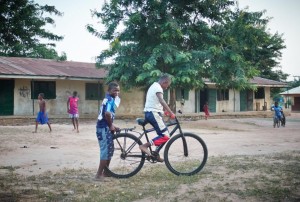 A youngster helps his frien
A youngster helps his frien
Bikes for the World operates efficiently. To begin, the group keeps expenses as low as possible, with a small four-person staff coordinating hundreds of individual volunteers and institution partners.
All operating expenses to collect, sort, store, and prepare bikes for shipment, to select qualified receiving organizations overseas and get information back for the U.S. public, are covered through funds raised locally by these means:
- Collections (a $10/bike contribution is requested at community-sponsored collections, and income from this source averages over $5/bike).
- Contributions from supporters (a growing source of income as Bikes for the World grows, permitting the picking-up of "unsponsored" bikes from institutions and further growth).
- Sales of a small percentage of donated bikes--fixed at 2% by the board. Many of these bike have limited value overseas and premium value here--such as older vintage road bikes and 1980s BMX collectibles.
Get the bikes there is a another story. Shipping for a 40-ft container costs anywhere from $3,000 (to Central America) to $8,000 (to inland Africa).
Rather than assume that a receiving organization is too poor to pay shipping and struggle itself to raise the shipping expenses, Bikes for the World charges these direct costs to the overseas partner.
This has multiple benefits. It enables Bikes for the World to focus on supplying a better "product" bicycles appropriate for the local environment, in better condition and augmented with valuable parts.
It's a process that enables Bikes for the World to collect and ship more bicycles to more programs, benefiting more individuals. And in requiring receiving partners to pay, it screens out less-competent organizations, or those with less credibility with third-party funders, and makes these more productive recipients "invested" in the success of the overall endeavor.
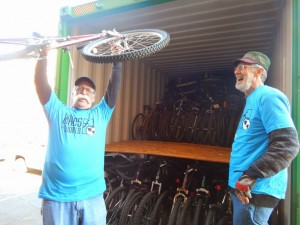 Volunteers with Bikes for the Worl
Volunteers with Bikes for the Worl
Bikes for the World is a "win-win-win" arrangement
- Donors of bicycles get the satisfaction of a charitable tax deduction and seeing their old bike go to good use, and not to the landfill (or collecting dust in storage).
- Bikes for the World promotes cycling in the United States. "We are part of the U.S. (bicycle) advocacy community," Oberg, an avid, long-time bicyclist, said. "Our program helps raise the profile of cycling and the image of the cycling community, familiarizes non-cyclists with bicycle technology and enables donors of bicycles to dispose of bikes that they are not using. This potentially creates the physical and emotional space to acquire a better bicycle that they may actually ride!"
- Individual volunteers experience a tangible and rewarding community service project, working with tools and learning about bicycles, promoting reuse and protecting the environment, helping others and participating in a team effort through their faith, community, school, Scout troop, or service club.
It's fun, and educational. For example, more than 100 young men have earned their Boy Scout Eagle rank by managing a Bikes for the World bike drive in their community. "This teaches a young man how to manage a project," Oberg said. "There are lots of skills that are required. There's also a beginning and an end to the project and that helps create a feeling of accomplishment. It's a nice feeling to know you helped a young person to grow."
- Through sponsoring and managing a Bikes for the World "bike collection," local service organizations provide their members with a satisfactory and educational service experience. They can realize their mission of protecting the environment and/or helping others and get their name out in front of the public. Many organizations in the greater Washington DC area sponsor annual collections and have done so for a decade or more.
- Receiving organizations overseas obtain valuable capital in the form of donated bicycles and spare parts, strengthening their operations and realizing their charitable mission.
- Individuals servicing the bikes overseas learn mechanic skills and earn income.
- And of course, the individual recipients of the bikes raise their productivity, benefiting themselves, their families, and their communities.
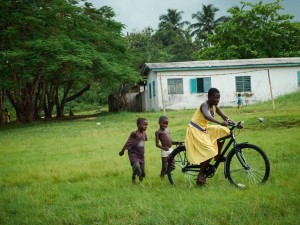 A new bicycle ride
A new bicycle ride
The Bikes for the World website (www.bikesfortheworld.org) provides extensive information on the organization's activities and accomplishments. As of today, Bikes for the World has shipped 113,196 bikes from its facilities in the Washington DC metro region.
About 95% of bikes have gone overseas- approximately half to Africa and the remainder to Central America, the Caribbean and the Philippines. Averaging close to 500 bikes per 40-ft container, that's some 250 shipments. A modest number of bicycles, especially road and children's bikes, have been donated to programs serving youth in disadvantaged communities in the United States, where they fight obesity and provide opportunities for at-risk youth to obtain skills and self-esteem.
Bikes for the World is a continental-wide program. It assists sister organizations and networks by placing their bikes overseas. In the last two years, shipments have come from: St Louis, Chicago, Madison WI, New York, NY and Ontario Canada. Bikes for the World expects to ship out of Pittsburgh PA and Charleston SC later this year. By early next year, Oberg expects to surpass 200,000 bikes processed one way or another.
Considering that the Bikes for the World motto is "Changing Lives One Bike At A Time," that's quite a few people who have benefited.
Those who want to help can do so in a number of ways. A $30 donation gets one bicycle from here to a deserving recipient overseas. Donations may be made by mail or on-line at www.bikesfortheworld.org/donate.
If you are close to the Bikes for the World core service area in the mid-Atlantic region, or close to a Bikes for the World affiliate or cooperating partner charity, you can also donate a bike. Finally, if your faith community, service club, school, Scout troop or other institution would like to collect bicycles, visit the Bikes for the Word website or write [email protected] for further information.
More and more people are realizing that bicycles offer an incredible solution to a number of modern-day problems - fitness, health, sustainability, pollution, traffic congestion. Here's another way a simple two-wheeled vehicle is helping mankind.
Note: The Parks and Facilities Catalog is a national supplier of commercial bike racks, custom bike racks and bike storage and bike lockers. We are also bicycling advocates and support Bikes for the World. We encourage other businesses to also support this great organization which is improving lives around the world, one container of bicycles at a time.


